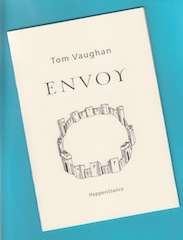‘Sea Swim’ by John Wedgwood Clarke
-Reviewed by Judi Sutherland–
The poems in John Wedgwood Clarke’s pamphlet, Sea Swim, are brief and bracing, like a dip in the North Sea off the beach at Scarborough. As the title indicates, the poems celebrate the sea, and in particular being in it, off that particular stretch of coastline. I notice, cynically, that the photo of Clarke himself on the back page depicts him in a nice cosy wetsuit.
It seems that the subject was not quite big enough for a whole pamphlet; there’s a slight eighteen poems in this sequence, but even so, a few of them seem like fillers, but let’s not quibble, because there are some excellent pieces here that show a playful command of language and Clarke’s evident love of his subject.
‘Beach Chalets’ is a lovely piece that conflates the inhabitants of these traditional seaside structures with poems:
Beach Chalets
…are small wooden stanzas
in which words undress
and step from the damp
boards and sixty-watt bulbs
into colossal light,
blinking, rubbing arms,
Lifting a little on their toes
as if trying to see over the cold.
Some of the descriptions are obviously gleaned from direct experience, such as the ‘tinny fizz’ which is the sound of droplets hitting the water in ‘Rain Swim’ (respect for that, John, I’ve never been swimming in the rain), and of the mixture of light and voices carrying across the water in ‘Landing’: ‘warm chirrup, chequered shell – / bright things silvering in, out, a missed / word heard as the sound of you tucked in’.
There are also poems about the atypical muse, Captain Webb (from Dawley), the first man to swim the channel unaided, who also featured in John Betjeman’s ‘A Shropshire Lad’, and whose connection with the Scarborough coast is that he once trod water there for 74 hours to win a £500 bet.
At times the poetry floats away beyond the subject of swimming. I enjoyed ‘Sea Swimming’, which begins with an epigraph from Captain Webb himself, in which he exhorts the would-be swimmer to aim for a small object ‘just out of reach’. Clarke picks this up and swims with it, beyond literal objects into memory, culminating with ‘fish resisting the barbs / of a lure, a kiss, the first / night of lost earrings’.
The spare, clean language and the meditative tone did lead me back to the otherworldly quiet and distance that we inhabit when swimming in the sea; so different from the clangour of the municipal pool. The pamphlet worked for me, as a call to sea swimming; and the pamphlet makes a suitable fusion of the arts and sport, sponsored by the Cultural Olympiad. The salty chill of the water is almost palpable in these poems. I should go down to the sea again. But I’m not going in without a wetsuit.




